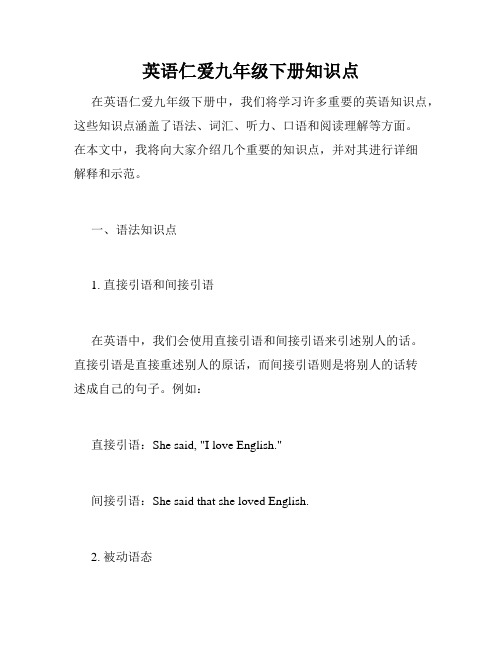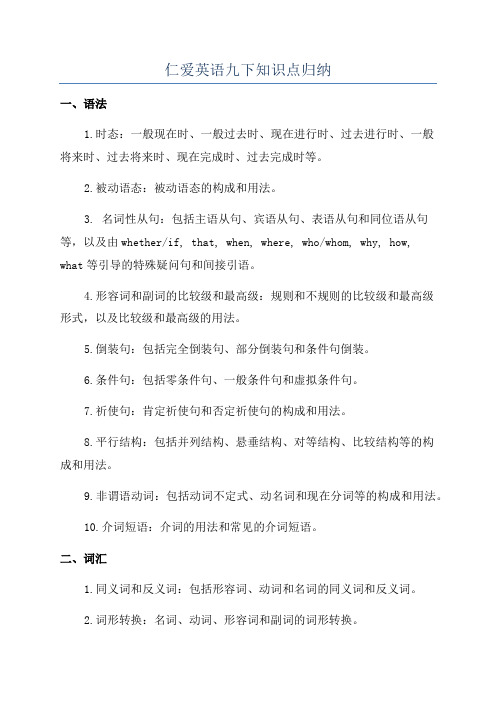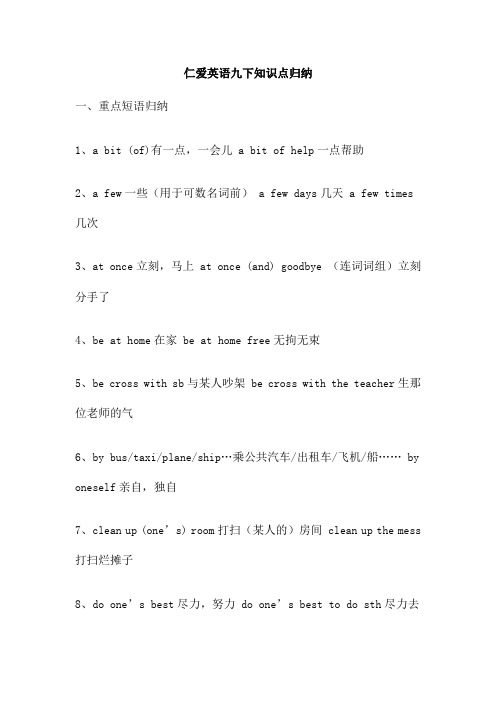九年级英语(仁爱版)下册语言点归纳
九年级英语(仁爱版)下册语言点归纳

精心整理U nit5KnowingaboutChinaTopic1HowmuchdoyouknowaboutChina?1.习惯用语:livewithsb与某人一起居住placesofinterest名胜millionsof成百万上千万,数以百万计allover/around/throughouttheworld世界各地suchas例如(后跟名词短语)thebirthplaceof……发源地anumberof一些,许多(饰复数名词,做主语时谓复)thenumberof……的数量(饰复数名词,做主语时谓单)fetchsb.sth./fetchsth.forsb.给某人取某物gothrough穿过liein位于lieon毗邻(接壤)lieto位于……附近(不接壤)beworthdoingsth.值得做某事hearof听说makeone’sdreamcometrue=realizeone’sdream实现梦想loseoneselfinabove在……的上方;on在……(表面)上overnotonly…butalso…不仅……而且……(领近原则)besurroundedwith/byflowers被花朵包围thehomeof……之乡beknown/famousas作为……而着称beknown/famousfor因为……而着称connectAwithB将A与Bregard…as把……看作goonavisitto=visit参观……breakdown损坏;分解;抛锚takeaway拿走becoveredwith被……覆盖dooutdooractivities做户外活动atthesametime同时2.重点句型:(1)It’(2)…,.(4)…(5)That’..(7)HongKongisknownastheOrientalPearlandShoppingHeaven.(8)People'swayoflifeinthenorthisquitedifferentfrom that inthesouth.(9)…,butpeopleinthesouthtravelnotonlybylandbutalsobywater.Topic2I’mbecomingmoreandmoreinterestedinChina’shistory1.习惯用语:inthefield/areaof在……领域learnfromsb.向某人学习attheageof在……年龄inone'sthirties在某人三十几岁时beproudof以……为傲,为……而骄傲takepridein以……为傲,为……而骄傲betheprideof是……的骄傲dieof死于……searchtheInternet上网搜索search+某地+forsth.搜查某地找某物assoonas……就……takeanactivepartin积极参加setup建立,创立bringdown推翻passaway去世;消失befullof充满……givealecture演讲;讲课achievethevictoryof取得……的胜利wipeout彻底消灭,全部摧毁succeedindoing成功做……2.重点句型:(1)Hewasagreatthinkerwhohadmanywiseideasandthoughtsaboutnatureandhumanbehavior.(2)Hespenttherestofhislifeteachingandwriting.(3)…theChinesepeopleareproudof.(4)It'shardtobelieve!(5)Whenhewasinhisthirties,(6)Unfortunately,(7)…,theRedArmysucceededinarrivinginGansuProvincein1936.(8)ConfuciusWasagreatmanwhosesayingsarestillveryfamous.3.重难点辨析:spend,cost,take和pay都可以表示“花费”(1)spend的主语必须是人,常用于以下结构:(1)spendtime/moneyonsth.在……上花费时间(金钱)。
(完整)仁爱版英语新九年级下册英语语法和短语

九年级下册英语语法Unit5Topic1agreatnumberofrivers大量的河流fetchsb.sth.=fetchsth.forsb.取东西给某人introducesth.indetail详细介绍某事liein/lieon/lieto说谎gothrough...经历bewell/worthdoingsth.某事做得好/坏abovesealevel海平面以上experiencefourseasonsinaday一天经历了四个季节hearof/hearfrom听说过/收到…的来信besurroundedby…被包围…loseoneselfin失去自己serveasabridge科技兴国connectsth.withsth.连接某事某物beknownas被称为haveachancetodosth.有一个做某事的机会beconsideredas/被认为/看作是…various/allkindsof各种各样protectagainst…保护…becoveredwith覆盖Topic2inthefieldofeducation在教育的领域上receive/get/haveagoodeducation接受/得到一个良好的教育attheageof55在55岁searchfor…搜索inone’sthirties在某人30岁的时候passaway/die去世cometoanend结束beproudof/betheprideof/takepridein以…为豪dieofillness死于疾病intotal总和takeanactivepartin…积极参与…be/becomepopularwith…成为流行…bringdowntheQingdynasty推翻清朝breakdownfromhardwork积劳成疾fullofregret充满遗憾facethedangerof…面临的危险wipeout消灭succeedindoingsth.成功做某事move/take/carry…tosafety带上安全带Topic3showsb.around…带某人参观asymbolof……的符号playanimportantpartin…在…中扮演重要的角色setupawoodencolumn树立一个木桩encouragesb.todosth.鼓励某人做某事carve…on…刻上promisetodosth.承诺做某事either…or…/neither…nor…/both…and…/notonly…but…also…要么…或…/既不是…也不是…/既...又.../不仅…还…crowdaround…围拢,聚集在…周围walkaward…走过去fightagainst…对抗;反对;与……作斗争inmemoryof…在记忆中thewriterandspeaker作者和演讲者beopento…是开放的…dependon…依赖于bebroughtto…被带到Unit6Topic1inmyspare/freetime在我的业余时间winaprize得奖wouldratherdosth.thandosth./prefertodosth.ratherthandosth.宁愿做某事而不愿做某事/宁愿做某事而不愿做另一件事fallinlovewith…爱上…inatiredvoice用疲惫的声音insurprise/surprisingly在吃惊bereadytohelpothers乐于助人what’smore更重要的是payattentiontodetails注意细节onceuponatime/longlongago从前/很久很久以前beangryatsth./beangrywithsb.对某事生气。
英语仁爱九年级下册知识点

英语仁爱九年级下册知识点在英语仁爱九年级下册中,我们将学习许多重要的英语知识点,这些知识点涵盖了语法、词汇、听力、口语和阅读理解等方面。
在本文中,我将向大家介绍几个重要的知识点,并对其进行详细解释和示范。
一、语法知识点1. 直接引语和间接引语在英语中,我们会使用直接引语和间接引语来引述别人的话。
直接引语是直接重述别人的原话,而间接引语则是将别人的话转述成自己的句子。
例如:直接引语:She said, "I love English."间接引语:She said that she loved English.2. 被动语态被动语态用于强调动作的承受者而不是执行者。
被动语态的构成是:助动词be + 过去分词。
例如:主动语态:Tom grows flowers in his garden.被动语态:Flowers are grown in Tom's garden.二、词汇知识点1. 同义词同义词是指意思相近或相同的词语。
通过学习同义词,我们可以更加丰富自己的词汇量,提高表达的准确性。
例如:happy - gladbeautiful - attractivebig - large2. 反义词反义词是指意思相反的词语。
学习反义词能够帮助我们更好地理解和运用单词。
例如:good - badhot - coldstart - stop三、听力和口语知识点1. 听力技巧在英语听力中,我们需要注意一些技巧来提高听力理解能力。
首先,要多听多练,提高对不同语速和口音的适应能力;其次,可以通过听英语歌曲、看英语电影等方式来提升听力水平;最后,要注意细节信息,如听清关键词和重要细节。
2. 口语表达口语是用于交流和表达的重要技能。
在口语表达中,要注意语音语调的准确运用,流利的句子结构和正确的词汇选择。
此外,多进行口语练习,与他人进行对话,参加英语角或英语演讲比赛等都是提高口语表达能力的有效途径。
(完整版)仁爱英语九下知识点归纳

…. from … 把…从… 分开
因…而著名
be famous as … be known as …. 作为….而出名
… “作为……而出名”
be known/famous for… “因……而出名”
be known to… “为……所熟知”
eg. Yao Ming is known/famous as a basketball player. 姚明作为一名蓝球运动员而出名.
West Lake is known/famous for its beautiful scenery. 西湖因秀丽的景色而出名.
位于杭州市的西湖是中国最著名的湖泊之一。
There are three beautiful places which shouldn’t be missed by visitors to China.
有三个不容被来到中国的游客所错过的美丽地方。
It’s Mount Tai that/ which lies in Shandong Province.
That’s the most fantastic place (that) I have ever heard of.
West Lake which lies in Hangzhou is one of the most famous lakes in China.
守卫整个民族
在… 发挥重要作用
由白色的大理石制成
…..to… 从…. 延伸到….
由成袋的泥土和木头制成
– height ( n.) 6. wear ---- wore ---- worn
仁爱英语九下知识点归纳

仁爱英语九下知识点归纳一、语法1.时态:一般现在时、一般过去时、现在进行时、过去进行时、一般将来时、过去将来时、现在完成时、过去完成时等。
2.被动语态:被动语态的构成和用法。
3. 名词性从句:包括主语从句、宾语从句、表语从句和同位语从句等,以及由whether/if, that, when, where, who/whom, why, how,what等引导的特殊疑问句和间接引语。
4.形容词和副词的比较级和最高级:规则和不规则的比较级和最高级形式,以及比较级和最高级的用法。
5.倒装句:包括完全倒装句、部分倒装句和条件句倒装。
6.条件句:包括零条件句、一般条件句和虚拟条件句。
7.祈使句:肯定祈使句和否定祈使句的构成和用法。
8.平行结构:包括并列结构、悬垂结构、对等结构、比较结构等的构成和用法。
9.非谓语动词:包括动词不定式、动名词和现在分词等的构成和用法。
10.介词短语:介词的用法和常见的介词短语。
二、词汇1.同义词和反义词:包括形容词、动词和名词的同义词和反义词。
2.词形转换:名词、动词、形容词和副词的词形转换。
3.词组和固定搭配:包括常见的动词短语、介词短语和固定搭配。
4.拓展词汇:通过课文和阅读中的生词来拓展词汇量。
三、阅读理解1.阅读技巧:包括快速阅读、略读和精读等阅读技巧。
2.阅读目的:阅读目的与方法、阅读态度等。
3.推理判断:根据文中的线索进行推理判断。
4.阅读策略:在阅读过程中合理运用策略,如概括大意、寻找关键信息等。
5.阅读材料:包括新闻报道、广告、说明文、记叙文、演讲稿等。
四、写作技巧1.写作结构:包括写作的开头、主体和结尾。
2.写作方法:写作时的选择和组织材料的方法。
3.写作技巧:包括描述、演绎、引用、对比、举例、定义、归纳、递进等写作技巧。
4.书信写作:包括给朋友写信、给老师写信、给亲人写信等。
5.口头表达:包括认为、喜欢、想法、建议和目的等一般句型的用法。
五、其他知识点1.国际音标:了解国际音标的符号和发音。
仁爱版九年级英语下册知识点汇总

仁爱版九年级英语下册知识点汇总Unit 1: Friends- Vocabulary: Words related to friendship and personality traits- Reading: Reading passages about friendship and relationships- Listening: Listening to dialogues and conversations about friends Unit 2: Hobbies- Vocabulary: Words related to hobbies and leisure activities- Grammar: Using the present perfect tense to talk about experiences- Reading: Reading texts about different hobbies and interests- Listening: Listening to people discussing their hobbiesUnit 3: Environment- Vocabulary: Words related to the environment and environmental issues- Grammar: Using modals to express possibility and obligation- Reading: Reading articles about environmental problems and solutions- Listening: Listening to discussions about ways to protect the environmentUnit 4: Health- Vocabulary: Words related to health and healthy lifestyle- Grammar: Using should and shouldn't to give advice- Reading: Reading passages about healthy habits and diseases- Listening: Listening to conversations about health and wellbeingUnit 5: Jobs- Vocabulary: Words related to different professions- Grammar: Using the simple present tense to talk about habitual actions- Reading: Reading texts about various types of jobs- Listening: Listening to interviews and discussions about career choicesUnit 6: Technology- Vocabulary: Words related to technology and electronic devices - Grammar: Using the present continuous tense to talk about future plans- Reading: Reading articles about the impact of technology on society- Listening: Listening to talks and discussions about technological advancementsUnit 7: Travel- Vocabulary: Words related to travel and tourism- Grammar: Using the past simple tense to talk about past events- Reading: Reading passages about different travel destinations and experiences- Listening: Listening to travel stories and conversations about vacationsUnit 8: Dreams- Vocabulary: Words related to dreams and ambitions- Grammar: Using the future tense to talk about future plans and aspirations- Reading: Reading texts about people's dreams and goals- Listening: Listening to people sharing their hopes and dreamsUnit 9: Review- Revision of vocabulary and grammar from previous units- Practicing all language skills: reading, writing, listening, and speaking以上是仁爱版九年级英语下册的知识点汇总。
仁爱版:初三下册英语重点词组、句型全梳理(精品)

仁爱版:初三下册英语重点词组、句型全梳理Unit 5 Topic 1 一、重点词汇(一)词形转换1. attract (v.) 吸引---attraction (名词)-- attractive (adj.) 吸引人的 2. tour ---tourist (名词) 游客3. introduce (动词)--introduction(名词) 4.long ( adj. )--- length ( n. ) 5. high( adj.) – height ( n.) 6. wear ---- wore ---- worn 7 enemy -- enemies 8. responsible ---- responsibility ( 二.)重点短语对……几乎不了解1. know little about Know more / a little / nothing about…2. place(s) of interest 名胜古迹中华文化的3. the birthplace of Chinese culture 中华文化的发源地吸引了成百万的游4. attract millions of tourists 吸引了成百万的游客许多5. a great number of 许多the number of …的数目6. the second longest river 第二长河7. fetch sb. sth. = fetch sth. for sb. 为某人取某物8. introduce …in detail 详细地介绍……introduce A to B 把A 介绍给Bintroduce oneself 自我介绍9. lie in 位于……内流经/ 途经……10. run / go through…流经11. be well worth doing sth. 很值得做某事12. regard…as…把……看成…..be regarded as …被当作…13. a symbol of imperial power 帝王权利的象征14.carve sth. on the stone 把…刻在石头上守卫整个民族15.guard the whole nation 守卫整个民族16.play an important part / role in 在…发挥重要作用17.be made of white marble 由白色的大理石制成18.stretch from …..to…从…. 延伸到….19.be made of packed earth and wood 由成袋的泥土和木头制成be made of stone and brick 由石头和砖块制成20.bring tourists into China 把游客带入中国21.a treasure of Chinese civilization 中华民族的瑰宝把…连接在一起22.join…together …. 把…连接在一起23.wear away (wore away, have / has worn away )磨损24.separate …. from …把…从…分开25. be famous for 因…而著名be famous as …be known as …. 作为….而出名26.an important Chinese export 一项很重要的中国出口产品27.sound similar to 听起来和…很相像28.the mild climate 温和的气候29. rich soil 肥沃的土地30.develop unique tea culture 发展独一无二的茶文化二.重点句型自从…以来已1. It is / has been ……since ….. 自从…以来已经多久了2. And many of them are famous, such as Mount Song, Mount Huang and Mount Emei. 它们当中许多很有名,比如嵩山、恒山和峨眉山。
仁爱英语九下知识点归纳

仁爱英语九下知识点归纳一、重点短语归纳1、a bit (of)有一点,一会儿 a bit of help一点帮助2、a few一些(用于可数名词前) a few days几天 a few times 几次3、at once立刻,马上 at once (and) goodbye (连词词组)立刻分手了4、be at home在家 be at home free无拘无束5、be cross with sb与某人吵架 be cross with the teacher生那位老师的气6、by bus/taxi/plane/ship…乘公共汽车/出租车/飞机/船…… by oneself亲自,独自7、clean up (one’s) room打扫(某人的)房间 clean up the mess 打扫烂摊子8、do one’s best尽力,努力 do one’s best to do sth尽力去做某事9、get on (with sb) (与某人)相处 get on well with sb与某人相处得好 get on well with one’s work工作进展顺利10、get to the station到车站 get to the airport到机场 get to the head of the queue到队头 get to know sb认识某人11、give sb a hand帮助某人 give sb a hand with sth帮助某人做某事 give sb a hand in doing sth帮助某人做某事 give sb a call 给某人打 give one’s regards to sb向某人问候 give sb a ring 给某人打 give sb a message给某人留言 give the message to sb 给某人留言12、have a good time (doing sth)玩得高兴,过得愉快 have a good time (in) doing sth做某事玩得高兴、过得愉快 have a good time with sb和某人一起玩得高兴 have a good time at home在家过得愉快 have a good time at work在工作上过得愉快 have a good time on one’s own自己过得愉快13、help oneself to请自便 help oneself to sth请自便吃某菜 help (to) do sth帮助做某事 help sb (to) do sth帮助某人做某事 helpsb with sth帮助某人做某事 help oneself to do sth请自便做某事 help oneself with sth请自便用某物 help with one’s work 帮助工作 help with one’s homework帮助做家庭作业 help to clean up the classroom帮忙打扫教室 help to clean up the sitting-room 帮忙打扫客厅14、keep healthy/fit保持健康 keep healthy/fit by doing sth 通过做某事保持健康 keep healthy/fit on one’s own自己保持健康 keep fit in every way通过各种方法保持健康 keep fit and strong保持健康强壮 keep healthy/fit through exercise通过锻炼保持健康 keep healthy/fit through good eating habits通过良好的饮食习惯保持健康 keep healthy/fit by going to see a doctor通过看医生保持健康15、like this这样(指前面所述内容) like this, like that这样那样(分别) like this and that这样那样(交替) like this kind of thing这样一类东西 like this sort of thing这样一类的东西 like this, that and the other这样那样都来点 like this and that in turn这样那样交替进行16、make one’s way to…前往…… make one’s way through…穿过……,在……中前进 make one’s way home回家 make one’s way to the nearest crossing走到最近的十字路口 make one’s way to the station到车站去 make one’s way to the classroom到教室去 make one’s way through the crowd在人群中前进 make one’s way through the traffic在车流中前进17、not at all别客气,没什么 not at all (用于回答感谢,用在正式场合)不用谢,没什么 not at all (用于回答道歉,意为一点也不介意)没关系,一点也不 not at all (用于表示否定意义或委婉谢绝)决不,一点也不 not at all (用于表示轻蔑、不耐烦等)得了,得了,别胡扯了! not at all (用于表示不在乎、一无所知等)没关系,一点也不 not at all (用于强调程度)非常 not at all (用于加强语气)完全地,彻底地 not at all you are welcome不客气(回答感谢用语) you are welcome不客气(回答道歉用语) welcome 是 you are welcome的缩写形式。
- 1、下载文档前请自行甄别文档内容的完整性,平台不提供额外的编辑、内容补充、找答案等附加服务。
- 2、"仅部分预览"的文档,不可在线预览部分如存在完整性等问题,可反馈申请退款(可完整预览的文档不适用该条件!)。
- 3、如文档侵犯您的权益,请联系客服反馈,我们会尽快为您处理(人工客服工作时间:9:00-18:30)。
Unit 5 Knowing about ChinaTopic 1 How much do you know about China?1.习惯用语:live with sb 与某人一起居住places of interest名胜millions of成百万上千万,数以百万计all over/ around/ throughout the world世界各地such as例如(后跟名词短语) the birthplace of……发源地a number of一些,许多(饰复数名词,做主语时谓复)the number of……的数量(饰复数名词,做主语时谓单)fetch sb. sth./fetch sth. for sb. 给某人取某物go through穿过lie in位于lie on 毗邻(接壤)lie to 位于……附近(不接壤)be worth doing sth.值得做某事hear of听说make one’s dream come true= realize one’s dream实现梦想lose oneself in…沉浸于……above在……的上方;on 在……(表面)上over在……的(垂直)正上方,(还表跨越、覆盖)not only…but also…不仅……而且……(领近原则)the surrounding area of周边地区be surrounded with /by flowers被花朵包围be surrounded on three sides by mountains 三面环山the home of……之乡be known/famous as 作为……而著称be known/famous for 因为……而著称connect A with B 将A与B连接/联系起来regard…as 把……看作go on a visit to= visit 参观……break down损坏;分解;抛锚take away拿走be covered with被……覆盖do outdoor activities做户外活动at the same time同时2.重点句型:(1)It’s two years since Mr. and Mrs. Green came to China.= Mr. and Mrs. Green have been in China for two years,(1)They're the birthplaces of Chinese culture.她们是中国文化的发源地(2)…,I can fetch you Guide to China.It’s a book which introduces China in detail.(3)Tibet is in the southwest of China,isn't it?(4)…they are well worth visiting.(5)That’s the most fantastic place that I have ever heard of.(6)The scenery is so attractive that visitors often lose themselves in it.(7)Hong Kong is known as the Oriental Pearl and Shopping Heaven.(8)People's way of life in the north is quite different from that in the south.(9)…,but people in the south travel not only by land but also by water.Topic 2 I’m becoming more and more interested in China’s history1.习惯用语:in the field/ area of 在……领域learn from sb.向某人学习at the age of在……年龄in one's thirties在某人三十几岁时be proud of以……为傲,为……而骄傲take pride in以……为傲,为……而骄傲be the pride of是……的骄傲die of死于……search the Internet上网搜索search +某地+for sth. 搜查某地找某物as soon as……就……take an active part in积极参加set up建立,创立bring down推翻pass away去世;消失be full of充满……give a lecture演讲;讲课achieve the victory of取得……的胜利wipe out彻底消灭,全部摧毁succeed in doing成功做……2.重点句型:(1)He was a great thinker who had many wise ideas and thoughts about nature and human behavior.(2)He spent the rest of his life teaching and writing.(3)…the Chinese people are proud of.(4)It's hard to believe!(5)When he was in his thirties,he took an active part in the battle against the Qing dynasty.(6)Unfortunately,Sun Yat-sen broke down from hard work and passed away full of regrets on March 12th. 1925.(7)…,the Red Army succeeded in arriving in Gansu Province in 1936.(8)Confucius Was a great man whose sayings are still very famous.3.重难点辨析:spend,cost,take和pay都可以表示“花费”,但用法却不尽相同。
(1)spend的主语必须是人,常用于以下结构:(1) spend time /money on sth. 在……上花费时间(金钱)。
例:I spent two hours on this maths problem. 这道数学题花了我两个小时。
(2) spend time /money (in) doing sth. 花费时间(金钱)做某事。
例:They spent two years (in) building this bridge. 造这座桥花了他们两年时间。
(2)cost的主语是物或某种活动,还可以表示“值”,常见用法如下:(1)sth. costs (sb.) +金钱,某物花了(某人)多少钱。
例:A new computer costs a lot of money. 买一台新电脑要花一大笔钱。
(2) (doing) sth. costs (sb.) +时间,某物(做某事)花了(某人)多少时间。
例:Remembering these new words cost him a lot of time. 他花了大量时间才记住了这些单词。
注意:cost的过去式及过去分词都是cost,并且不能用于被动句。
(3)take后面常跟双宾语,常见用法有以下几种:(1) It takes sb. +时间+to do sth. 做某事花了某人多少时间。
例:It took them three years to build this road. 他们用了三年时间修完了这条路。
(2)doing sth. takes sb. +时间,做某事花了某人多少时间。
例:Repairing this car took him the whole afternoon. 他花了一下午修车。
(4)pay的基本用法是:(1) pay (sb.) money for sth. 付钱(给某人)买……。
例:I have to pay them 20 pounds for this room each month. 我每个月要付20英磅的房租。
(2)pay for sth. 付……的钱。
例:I have to pay for the book lost. 我不得不赔丢失的书款。
(3)pay for sb. 替某人付钱。
例:Don’t worry! I'll pay for you. 别担心,我会给你付钱的。
(4)pay sb. 付钱给某人。
例: They pay us every month.他们每月给我们报酬。
(5)pay money back 还钱。
例:May I borrow 12 yuan from you? I'll pay it back next week. 你能借给我12块钱吗?下周还你。
(6)pay off one's money还清钱Topic 3 The dragon has become a symbol of the Chinese nation.1.习惯用语:show (sb.)around/round someplace带领(某人)参观某地show sb. sth. =show sth. to sb. 把某物给某人看in the year of the dragon 在龙年 a symbol of……的象征play an important part in在……中起重要作用promise (sb.) to do sth.(向某人)承诺做某事encourage sb. to do sth.鼓励某人做某事either...or... 者……或者...not as/so…as…不如……一样……both…and…两者都……neither... nor... 既不……也不……play chess下棋in memory of…为了纪念…depend on依靠;取决于;信赖fight against+事物名词“为反对……而斗争”fight against+人或国家“与……战斗”fight for+抽象名词为(事业,自由,真理,权利)而斗争win+比赛,战斗,奖品打赢……,获得……be similar to 和……相似be the same as和……一样the writer and speaker作家兼演说家at the end of在……的末端/尽头,by the end of 到……为止2.重点句型:(1)That's correct!(2)It also plays an important part in Chinese festivals.(3)My elder brother was born in the year of the dragon…(4)…,but I can't play it as well as my father..(5)Neither my mother nor my father likes it,…(6)People invented Chinese chess in memory of the famous battle.(7)China is the home of tea,which has more than 4,000 years of history.(8)Tea from China,along with silk and porcelain,begin to be known by the world over a thousand years agoand has been an important Chinese export since then.(9)A friendship between gentlemen is like a cup of tea.3.词组的运用:both...and…,either...or...,neither...nor…,not only...but also...e.g.(1)Either Beihai Park or Shichahai is a good place to visit.(2)Both my father and I like it very much.(3)Neither my mother nor my father likes it.Unit 6 Entertainment and FriendshipTopic 1 I would rather watch sports shows than those ones一、重点短语1、take part in 参加2、in one’s spare/ free time 在某人的业余时间3、agree with sb.同意某人的意见4、be ready to do sth.准备好做某事,乐于做某事5、win a prize获得奖品6、give sb. a sudden attack on the(部位)给某人…一个突然袭击7、be tired of…对……感到厌烦8、from then on 从那时起9、order sb. to do sth.命令某人做某事10、fall in love (with sb.) 与某人相爱11、in total总计12、once upon a time从前=long long ago13、be angry at sth. 对某事感到生气14、keep secrets 保守秘密15、pay attention to…注意16、a homeless/ running /lucky dog丧家犬/走狗/幸运儿17、stand for 代表18、have a huge /bad influence on…在…….方面起了巨大/ 坏的影响19、ways of doing sth. 做某事的方式20、keep…away from…使……远离…….21、a waste of time 浪费时间22、do research 做研究23、support one’s view 支持某人的观点二、重点句型1、It’s nothing.没什么2、It is hard for me to learn to play Chinese chess. 对于我来说学下中国象棋是很困难的.3、I’m tired of watching those shows. 我对看那些节目感到厌烦.4、Which program do you prefer, TV plays or sports shows? 你更喜欢看哪一种节目,电视剧还是运动节目?5、----I would rather watch sports shows. 我更喜欢看运动节目. ----So would I. 我也是.6、The mother of the land was quite angry at what he said.大地的母亲对他所说的相当的生气.7、Whenever scorpions appeared, hunters would hide. 无论蝎子什么时候出现,猎人们都会躲藏起来.8、As we know, there are differences between western culture and Chinese culture.众所周知, 中西方文化存在着不同.三、重点知识点1.I would rather watch TV shows than sports shows. 我宁愿看电视剧而不愿看运动节目.would rather…than…表“宁愿……而不愿”, 与prefer…to…同义,但它们在结构上不同.前者是would rather do sth. than do sth.,= would do sth. rather than do sth.…;后者是prefer doing sth. to doing sth.=prefer to do sth. rather than do sth.eg: I would rather stay at home than go out. = I prefer staying at home to going out.= I would stay at home rather than go out..=I prefer to stay at home rather go out.我宁愿呆在家中而不愿出去.2.Was his wife still alive? 他的妻子还活着吗?alive 表“活着的”, 常修饰人,而不修饰物. 一般作表语或宾补.living 同义, 既可修饰人, 也可修饰物. 在句中既可作定语也可作表语.eg: The old woman is still alive/living.(作表语) 那个老人还活着.The king wanted to keep Gulliver alive.(作宾补) 国王想让格利佛活着.There is no living things on Mars.(作定语)火星上没有生物.3.She ordered a scorpion to hide in the dark to attack him.order sb. to do sth. 命令/要求某人去做某事order sth for sb./ sth. 为某人/ 某物订购某物eg: The doctor ordered me to stay in bed. 医生命令我好好呆在床上休息.He often orders books for his son. 他经常为他的儿子订书.She ordered a suit for her dog. 她为她的狗订购了一套衣服.4.However, sometimes you do not forgive others.然而, 你有时不会原谅别人.forgive sb. sth. 原谅某人某事forgive sb. for doing sth. 请求别人原谅所做的事eg: She could forgive him anything. 她会原谅他的任何事.Please forgive me for disturbing you. 请原谅我打扰你了.5. But in western countries, dogs are considered honest and good friends of humans但是在西方国家, 狗被认为是诚实的, 是人类的好朋友.honest 用作形容词, 表“诚实的; 正直的” . 在句中可作定语, 表语或宾补.He is an honest man. = The man is honest.他是一个诚实的人.固定搭配: be honest with sb. 对某人坦诚相待to be honest 说实话, 老实说Topic 2 Who is your favorite character in Chinese literature?一、重点短语1、work hard at…在……方面努力工作2、works of art艺术作品3、according to根据4、the introduction to the painting 画的介绍5、express strong feelings 表达强烈的情感6、in the distance 在远处7、make up one’s mind to do sht.下定决心做某8、express the real meaning of friendship 说明了友谊的真正含义9、walk through the desert穿过沙漠10、have an argument争辩/吵11、slap sb. in the face 打了某人一计耳光12、with the help of+ with one’s help在某人的帮助下13、keep on doing sth. 继续做某事14、take a bath 洗澡15、get stuck in 陷入……16、can’t help doing sth.情不自禁地做某事17、erase…from…从……当中抹/擦掉18、be good at hiding 善于隐身19、save one’s life救了某人的命20、catch up with追上,赶上二、重点句型1.It is a pity that he died when he was very young. 遗憾的是, 他英年早逝.2.What (do you think) are the most important things I need to know about paintings?你认为,关于绘画, 我需要知道的最重要的事情是什么?3.Well, that depends on what kind of paintings you want to learn.4.Then you can decide whether you want to become a painter or not.(宾语从句)那时你就能决定是否想成为一名画家.5.It says here that Gu Kaizhi is quite good at painting figures.( 宾语从句)这儿写着顾恺之尤其擅长画人物画.6.The way he shows things in the distance is different from the way Gu Kaizhi does.(定语从句)他描绘远景的方式与顾恺之不同.7.Perhaps that is the reason why I prefer to paint landscapes.(定语从句)也许那就是我为什么更喜欢画风景画的原因.8.…, it was Sandy and Pigsy who helped the Monkey King win every battle.(定语从句)沙僧和猪八戒帮助美猴王赢得每一次战役的胜利.9.One tree can’t make a forest. 独木不成林.10.But without saying anything, he wrote in the sand. 但什么也没说,他写在了沙子中.三、重点知识点1.paint 与draw 都具有“绘画”的含义,但有很大区别paint 表示用颜料等画带有色彩的画, 如油画、水彩画及画正式的肖像画。
